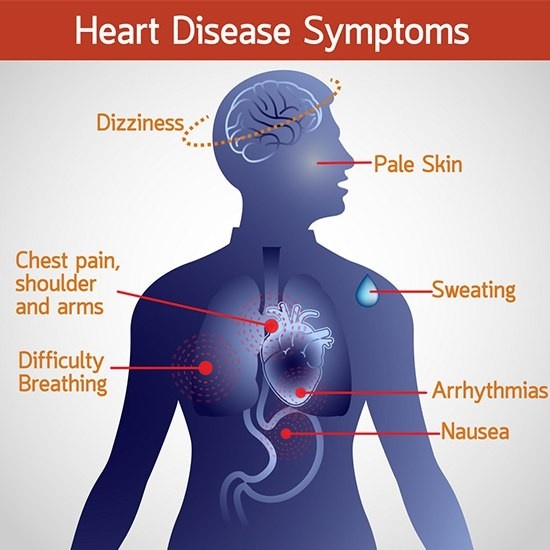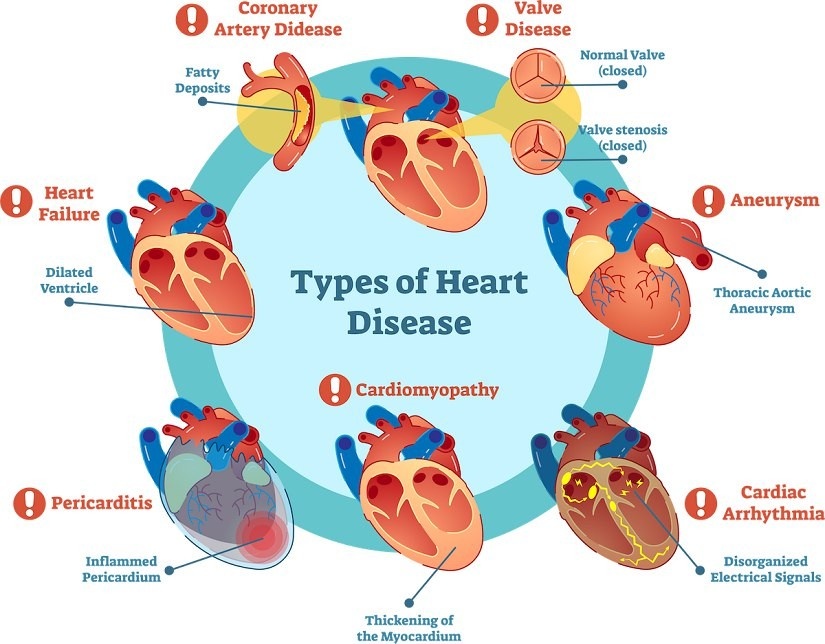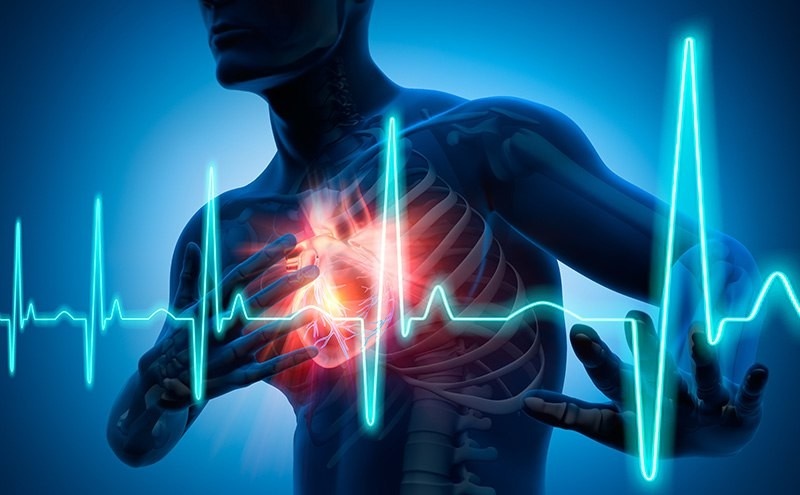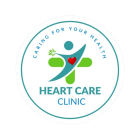Introduction
Table of Contents
Diseases related to the heart have always been a major concern for health and are often considered silent killers. spot heart disease causes This is so because it progresses and gets serious when it reaches a critical stage, but by this time, the symptoms either are not quite noticeable or are not established. So, early detection or awareness is very important to prevent something serious from occurring. We will explore heart disease by knowing its causes and different symptoms, which sometimes can be very deadly if not focused on properly. We will expose the serious symptoms that are considered deadly, giving you special knowledge in taking care of your health.
Spot heart disease is a general word for a wide variety of conditions that affect the heart’s ability to work correctly. The most common types include:
Coronary Artery Disease (CAD): CAD is the accumulation of plaque in the coronary arteries, which are the conduits to the heart. It actually blocks the arteries, which slowly decreases blood flow to the heart muscle and causes heart attacks.

Heart Attack (Myocardial Infarction): It occurs due to a blocked coronary artery that results in the death or damage of a part of the heart muscle. Symptoms include chest-pain, shortness of breath, nausea, and a few more.
Arrhythmias: It is a condition of irregular heartbeats, which, if not treated accurately can cause severe problems. A common form of arrhythmias is atrial fibrillation and ventricular tachycardia.
Heart Failure: A situation in which the heart completely or inadequately pumps blood around the body; it leads to fluid retention in the lungs and other body tissues. The disease manifests through symptoms of fatigue, shortness of breath, and leg swelling.
Key Risk Factors
Adequate knowledge concerning major risk factors, which are associated with heart disease, must be understood in order to prevent it. Such key risk factors include:
High Blood Pressure: This condition, also known as hypertension, forces the heart to pump blood harder, which damages arteries and elevates heart attack risks.
High Cholesterol: Too much LD (bad) cholesterol causes plaque buildup in the arteries, which narrows the blood vessels.
Smoking— Damages blood vessels, raises blood pressure, and reduces oxygen levels in the blood; thus, causing heart disease.
Diabetes— due to high sugar levels, it may injure the blood vessels and cause damage to nerves, and increase one’s risk to contract heart disease.
Obesity— Mass accumulation leads to high blood pressure, diabetes, and high cholesterol, which all in one way or the other may expose one to a chance of heart disease.
Family History: A family history of heart disease can increase your risk, especially if a close family member got heart disease before the age of 55.
Recognize the Warning Signs
The good knowledge of the disease symptoms leads to early treatment, thus averting the fatal cases. The crucial warning signs to look out for include:

Chest Pain or Discomfort: Characteristically with a sensation of heavy, squeezing, or crushing pain but at times as a discomfort instead of pain. It may also be accompanied with sweating, nausea, or dizziness.
Shortness of Breath: Can be associated with activity or at rest. It can be suggestive of a condition called heart failure or a heart attack in the situation of sudden severe shortness of breath.
Fatigue: Unexplained or extreme tiredness, particularly when it is accompanied by other symptoms, like chest pain or shortness of breath, could be an indication of heart attack.
Swelling: Swelling in the legs, ankles, or feet, medically termed as edema, may point to heart failure.
2. Identify Symptoms of Serious Heart Conditions
There are several heart conditions that issue very distinctive symptoms.
Heart Attack: This can reveal as severe chest pain, discomfort in the upper body, shortness of breath, nausea, and lightheadedness. At times, women can also have atypical symptoms including unexplained fatigue, nausea, and back pains.
Arrhythmias: Palpitations, which actually feel like your heart is beating fast, racing or fluttering, are the most common symptom. Other symptoms that come with arrhythmias are dizziness, fainting, and fluttering in the chest.
Heart Failure: The most common signs include a persistent dry cough with pink or white mucus, shortness of breath, and sudden weight gain because of fluid retention during lying down.
3. Diagnosis Tests for Early Identification
Heart diseases can be identified by the following tests, which reflect the activity of the heart and find anything out of the ordinary:
Electrocardiogram: Monitors the electrical activity in the heart and identifies problems such as rhythm abnormalities or heart attacks.
Echocardiogram: This involves sound waves that produce images of the structure and function of the heart. It makes diagnosis of the problems in the valves and the chambers of the heart.
Stress Test: It measures how the heart responds to exertion by subjecting the patient to physical activities such as walking on a treadmill or enabling them to use a stationary bike. This helps in pinpointing specific problems that may not be noticed while the patient is at rest.
Blood Tests: Measure the amount of cholesterol, triglycerides, and other biomarkers that may recommend heart disease. Tests such as the level of troponin may aid in the diagnosis of a heart attack.

How to Find Out Dangerous Symptoms of Heart Disease:
1. The Significance of Regular Monitoring
It is essential that for early diagnosis, one should ensure regular monitoring of your health. The types of things you should keep a record of include:
Chest Pain Monitoring: The pain in the chest is always a matter of concern, so if you experience some chest pain/ discomfort, do maintain a couple of columns with time, duration, and triggering point; your health-carer might find the data.
Shortness of breath: Measure episodes of shortness of breath, especially if abrupt onset or unrelated to exercise.
Tracking Fatigue: Episodes of unusual, extreme fatigue, particularly if occurring with other symptoms.
2. Get Medical Help
Persistent chest pain: particularly if lasting more than a few minutes or worsen with activity and at night or accompanied by sweating, nausea, or shortness of breath
Severe Shortness of Breath: especially if occurs suddenly and not explained by exertion
Sudden weak or numb: especially affecting one side of your body, accompanied by trouble speaking
3. Take preventive steps.
Live a life enabled to prevent the chances of having heart diseases:
Healthy Foods: A diet that comprises a lot of fruits, vegetables, whole grains, and proteins, both lean and lowers the risk. The level of saturated and trans fats, sodium, and refined sugars should be taken in low levels.
Physical Activities: At least one hundred and fifty minutes of moderate-level physical activity every week, or seventy-five minutes of vigorous levels of activity, the two supporting muscle strength and body flexibility.
Avoid Smoking: When you quit smoking, your heart will reap the benefit, and there will be a reduction in the risks of heart disease
Moderate Alcohol Intake: Alcohol should be consumed within moderate limits- one drink daily for women, and for men, it should be limited to two drinks per day.
Stress Management: Use stress-reducing techniques in daily life. Stress management techniques, like mindfulness, meditation, relaxation practice should be included in daily life.
Real-Life Stories/Employed Experts
Clinical Vignettes

Case Study 1: The Condition People
A 55-year-old businessman suddenly developed severe chest pain in his workplace. He was slightly unwell, but the complaint was ignored as work stress. He immediately reported to his workplace medicals. Subsequently, his diagnosis was also done early enough as acute myocardial infarction, and he was managed appropriately for a good prognosis on prescription of medication and lifestyle modification.
Case Study 2: Treatment Of Spot Heart Disease Causes
Forty-five-year-old Sarah is a teacher who began to experience palpitations and dizziness. She seemed to associate it with a stressful situation and decided to disregard it for the meantime. Later on, she thought it best to go for a check-up. She received treatment with medications and lifestyle modifications, and her quality of life later improved significantly. Expert Quotes
Dr Rajesh Kumar, Cardiologist at the Heartcare Clinic Delhi, said it was important that people responded in a timely manner: “Heart disease often develops slowly, and symptoms can be subtle. Recognizing early warning signs and seeking prompt medical evaluation can prevent severe complications and improve outcomes.
Dr. Aarti Sharma, Nutritionist at Heartcare Clinic Delhi, elaborated: “A heart-healthy diet goes a long way in preventing heart disease. Simply including omega-3 fatty acids, antioxidants, and fiber in your diet can significantly reduce the risk of heart disease.
